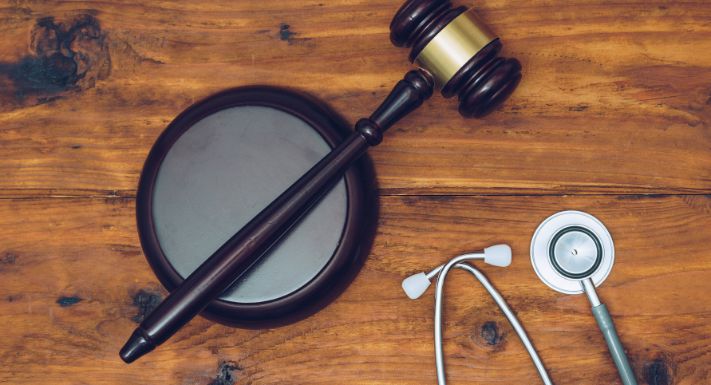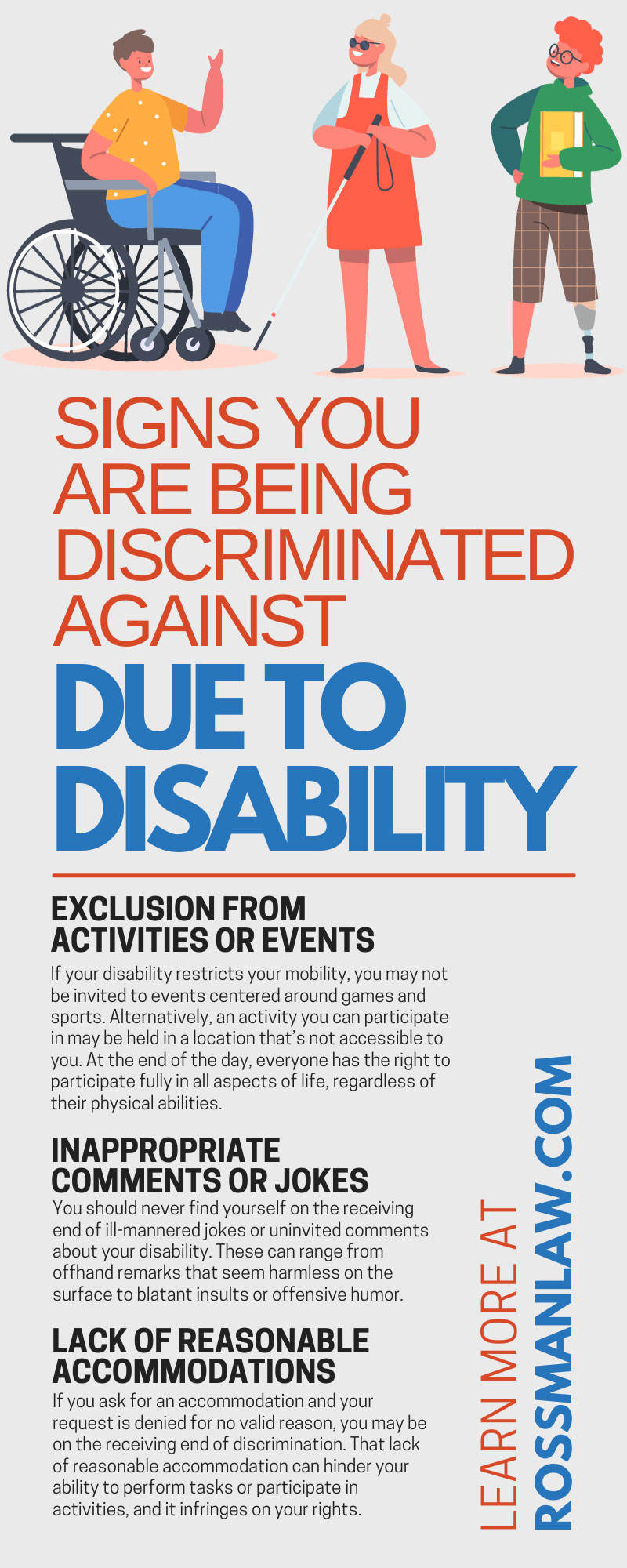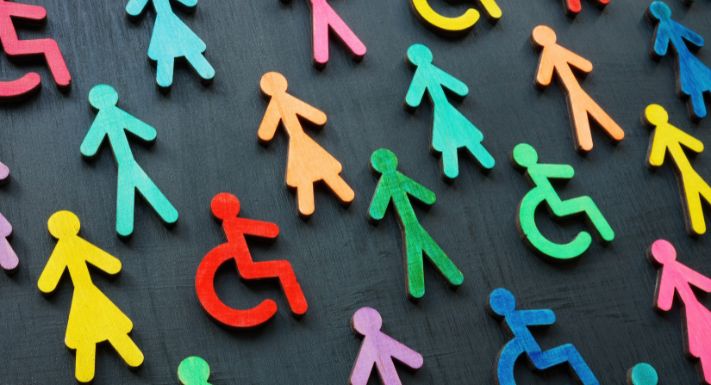
Importance of an Investigation in a Medical Malpractice Case
November 1, 2023
The Lasting Impact of Medical Malpractice on Patients
November 9, 2023Many individuals with disabilities live in a world that often fails to accommodate them. If you are living with a disability, you may face discrimination at one point or another during your lifetime. This maltreatment can subtly make its presence known, from the workplace to social gatherings, and it’s not always immediately recognizable.
However, there are several signs you are being discriminated against due to disability. Recognizing the signs of prejudice can help you advocate for better treatment, both for yourself and for other individuals with disabilities. This guide will equip you with the knowledge you need to identify and resolve these situations.
Exclusion From Activities or Events
Do you notice that you’re being consistently left out of events or fun activities at your workplace due to your disability? This exclusion may be a sign of discrimination, and it takes a few different forms.
For instance, if your disability restricts your mobility, you may not be invited to events centered around games and sports. Alternatively, an activity you can participate in may be held in a location that’s not accessible to you. At the end of the day, everyone has the right to participate fully in all aspects of life, regardless of their physical abilities.
Inappropriate Comments or Jokes
You should never find yourself on the receiving end of ill-mannered jokes or uninvited comments about your disability. These can range from offhand remarks that seem harmless on the surface to blatant insults or offensive humor.
Such comments or jokes can create an uncomfortable and hostile environment for you. It’s important to recognize that these behaviors are not only disrespectful but discriminatory, and you speak to a disability attorney in Boise, Idaho, for advice on combating this behavior in the workplace.
Lack of Reasonable Accommodations
The law requires employers, schools, and other establishments to provide reasonable accommodations for individuals with disabilities. These accommodations can include things like wheelchair ramps, sign language interpreters, or flexible work hours.
If you ask for an accommodation and your request is denied for no valid reason, you may be on the receiving end of discrimination. That lack of reasonable accommodation can hinder your ability to perform tasks or participate in activities, and it infringes on your rights.
Unequal Treatment
Are you being treated differently from other people in similar situations due to your disability? That disparity could indicate discrimination.
Unequal treatment can manifest in various ways, like being passed over for a promotion despite having the same qualifications and performance level as your peers. Or perhaps you’re routinely given less favorable assignments compared to your colleagues without disabilities. Discrimination isn’t always overt; it can often present itself through subtle differences you may miss at first.
Retaliation for Asserting Your Rights
If you have spoken up to defend yourself against unfair or discriminatory behavior and subsequently faced adverse consequences, you’re experiencing something called retaliation. Retaliatory acts include being demoted, receiving unfavorable reviews, or even losing your job.
However, retaliation isn’t just immoral and cruel; it’s legitimately illegal. The law recognizes retaliation as a form of discrimination, and you have the right to stand up for yourself without fear of punishment.
Difficulty in Career Progression
If you have noticed that your disability is posing a barrier to your career advancement, this could be a sign of discrimination. Despite having the necessary skills, experience, and qualifications, you may find it challenging to move up the corporate ladder.
You might recognize this trouble through consistent rejections for promotions. Perhaps you notice less qualified individuals without disabilities advancing ahead of you. Ultimately, your disability should not limit your career progression if you are otherwise qualified for the higher role.
Harassment
Harassment is a common form of discrimination experienced by a variety of protected classes, and individuals with disabilities are no exception. This behavior can range from offensive remarks and jokes, as discussed earlier, to more overt hostility.
Disability-based harassment can create an intimidating environment for you, but you should never have to endure it quietly. Recognizing it as a form of discrimination is the first step in taking action against it.
Isolation
Do you frequently find yourself physically isolated or separated from your peers due to your disability? Isolation is a common theme in disability discrimination, from social exclusion to hostile comments that make you feel alone.
This isolation may occur in a professional setting where you are given a workspace away from the rest of the team. Or perhaps you’re excluded from team-builders and office get-togethers by people unwilling to accommodate you. Regardless of your disability, you deserve to be included with the group and treated with respect.
Dismissal of Concerns
If you bring up issues related to your disability and find that your concerns or complaints are consistently ignored, you may be experiencing discrimination. This dismissal can happen in a variety of contexts, such as in the workplace, at school, or in a social setting.
You deserve to have your valid concerns about accessibility, accommodations, and inappropriate behavior taken seriously. Do you feel as though you’re not being heard? The individuals around you may not be respecting your rights and needs as a person with a disability.
Denial of Opportunities
In some instances, you may find that you’re being denied opportunities for training or development at work because of your disability. If you notice that you’re not being offered the same chances to enhance your skills as your colleagues without disabilities, that discrimination can be discouraging.
However, your disability should not prevent you from participating in professional development activities or furthering your education. Being denied these opportunities can limit your career growth and personal development—and it’s a clear sign of discrimination.
Recognizing the most common signs you are being discriminated against due to disability is the first step toward combating this pervasive problem. Remember that having a disability does not define your capabilities or your value as an individual. Each person deserves to be treated with dignity and respect, regardless of their level of ability.
Discrimination isn’t just a personal issue, either; it’s a societal one. Empowerment and education are the keys to protecting yourself and creating an inclusive environment free of discrimination and harassment. If you suspect you are being discriminated against due to your disability, contact the team at Rossman Law Group for a legal consultation free of charge.






